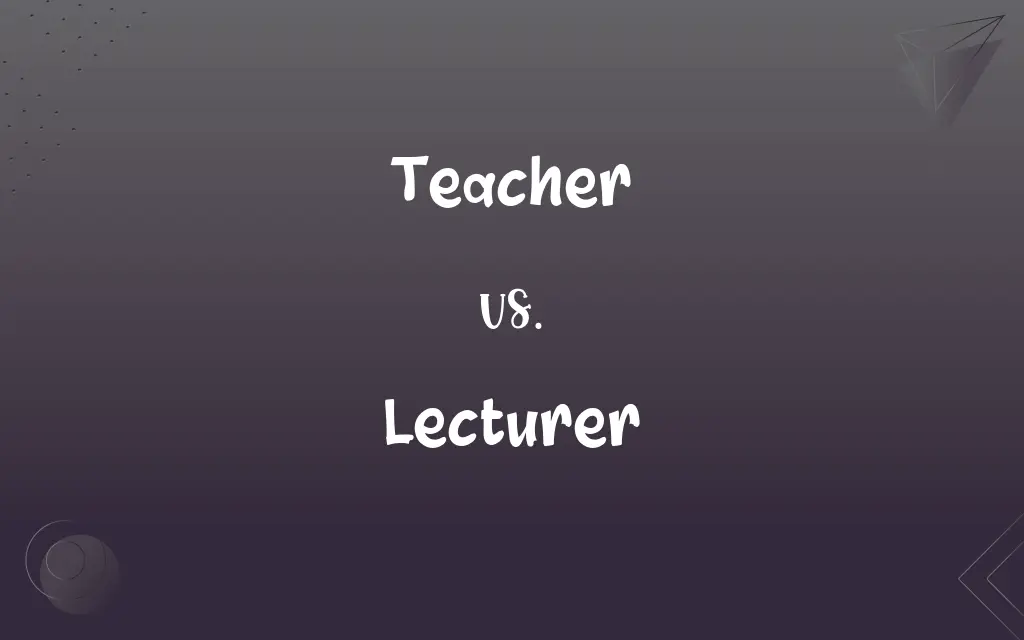Teacher vs. Lecturer: What's the Difference?
Edited by Aimie Carlson || By Harlon Moss || Updated on October 17, 2023
A teacher instructs students in primary or secondary schools, while a lecturer typically educates college or university students.

Key Differences
A teacher is a professional who instructs students, often in primary or secondary education settings. They are responsible for imparting knowledge, skills, and values to their students. On the other hand, a lecturer is an educator at the tertiary level, predominantly in colleges and universities, presenting topics related to a particular academic course or discipline.
While a teacher often works with smaller groups of students and might cover multiple subjects (especially at elementary levels), a lecturer usually specializes in a particular subject and addresses larger audiences, often delivering presentations or talks on specialized topics.
The responsibilities of a teacher often extend beyond just curriculum delivery. They might be involved in students' overall development, parent-teacher meetings, and extracurricular activities. Conversely, a lecturer might be more research-focused, contributing scholarly articles and engaging in academic discourse while having fewer interactions outside of the lecture setting.
In terms of qualifications, a teacher typically requires certification or a degree in education. This ensures they're equipped with pedagogical methods suitable for younger learners. A lecturer, however, often holds an advanced degree in a specific field, such as a master's or Ph.D., emphasizing their expertise in the subject matter.
Both teachers and lecturers play crucial roles in the educational journey of individuals. While teachers lay the foundation for basic concepts and foster a love for learning, lecturers delve deeper into specific topics, offering students a chance to explore subjects in depth.
ADVERTISEMENT
Comparison Chart
Level of Education
Primary or Secondary
Tertiary (College/University)
Audience Size
Typically smaller groups
Often larger groups or classes
Subject Range
Multiple subjects (especially at primary levels)
Specialized in one or few subjects
Interaction
High interaction with students beyond the curriculum
Primarily during lectures or office hours
Typical Qualification
Degree or Certification in Education
Advanced degree (Master's or Ph.D.) in the field
ADVERTISEMENT
Teacher and Lecturer Definitions
Teacher
A professional responsible for imparting knowledge and skills.
She's the best teacher I've ever had.
Lecturer
An academic expert delivering educational talks in colleges or universities.
The lecturer discussed recent developments in molecular biology.
Teacher
Someone guiding students' academic and moral growth.
The teacher helped him improve both academically and personally.
Lecturer
A tertiary level educator specializing in a particular subject.
The lecturer in anthropology has published several papers.
Teacher
An individual who educates students in schools.
The teacher assigned homework for the weekend.
Lecturer
An individual involved in higher education instruction, often with research responsibilities.
The lecturer just released a new study on urban development.
Teacher
A mentor fostering curiosity and understanding in students.
The teacher always encouraged questions and inquisitiveness.
Lecturer
Someone who gives formal presentations to college or university students.
The lecturer used slides to complement his talk.
Teacher
An instructor in various subjects, especially at lower educational levels.
The teacher taught both math and science to her fifth-grade class.
Lecturer
A college or university faculty member delivering scheduled talks on academic topics.
Students always looked forward to the lecturer's engaging sessions.
Teacher
One who teaches, especially one hired to teach.
Lecturer
One who delivers lectures, especially professionally.
Teacher
A person who teaches, especially one employed in a school.
Lecturer
A member of the faculty of a college or university usually having qualified status without rank or tenure.
FAQs
What's the main focus of a lecturer?
A lecturer primarily focuses on delivering subject-specific content to tertiary-level students.
What age group do teachers typically instruct?
Teachers usually instruct students in primary or secondary schools, ranging from early childhood to late teens.
Where do lecturers primarily work?
Lecturers typically work in colleges, universities, or tertiary education institutions.
Are teachers involved in extracurricular activities?
Many teachers participate in or oversee extracurricular activities at schools.
Do all teachers handle multiple subjects?
While elementary teachers might cover multiple subjects, secondary school teachers typically specialize in one.
How large are lecture classes usually?
Lecture classes can vary in size, but they often accommodate larger groups than typical school classrooms.
Do teachers undergo continuous training?
Yes, many teachers participate in professional development to enhance their skills.
Are lecturers' evaluations based on their research?
While teaching ability is important, many lecturers are also evaluated based on their research contributions.
Is the role of a lecturer limited to just lectures?
No, many lecturers also participate in seminars, workshops, and other academic activities.
How do the teaching styles differ between teachers and lecturers?
While teachers often use interactive and varied teaching styles, lecturers might lean more towards presentations and discussions.
Are teachers' roles more pastoral?
Yes, teachers often play a pastoral role, overseeing students' overall well-being and development.
Can a teacher become a lecturer?
Yes, if a teacher pursues higher academic qualifications, they can transition to a lecturer role.
Do teachers need a certification?
In most places, teachers need certification or licensure to teach in public schools.
Can a lecturer teach in schools?
While a lecturer's expertise is tertiary education, they can teach in schools if they meet the necessary certifications.
What's the main goal of a lecturer?
A lecturer's main goal is to impart specialized knowledge and promote academic discourse.
Do lecturers interact with students outside of lectures?
Yes, lecturers often have office hours where students can discuss topics in more detail.
Is research a common responsibility for lecturers?
Yes, many lecturers are involved in academic research alongside their teaching duties.
Do teachers interact with parents?
Yes, teachers often have parent-teacher conferences or meetings to discuss student progress.
Do lecturers need a Ph.D.?
Not always, but many lecturers hold a Ph.D. or a similar advanced degree in their field.
Are teachers trained in pedagogy?
Yes, teachers are typically trained in pedagogical methods suitable for their student age group.
About Author
Written by
Harlon MossHarlon is a seasoned quality moderator and accomplished content writer for Difference Wiki. An alumnus of the prestigious University of California, he earned his degree in Computer Science. Leveraging his academic background, Harlon brings a meticulous and informed perspective to his work, ensuring content accuracy and excellence.
Edited by
Aimie CarlsonAimie Carlson, holding a master's degree in English literature, is a fervent English language enthusiast. She lends her writing talents to Difference Wiki, a prominent website that specializes in comparisons, offering readers insightful analyses that both captivate and inform.
































































